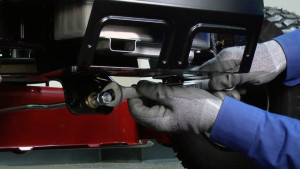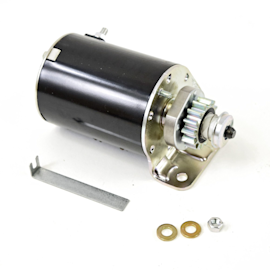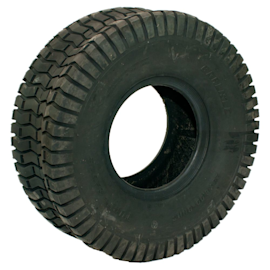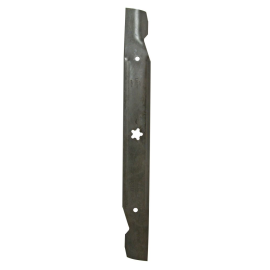- Kenmore refrigerator water filters
- Whirlpool refrigerator water filters
- Samsung refrigerator water filters
- GE refrigerator water filters
- LG refrigerator water filters
- Frigidaire refrigerator water filters
- KitchenAid refrigerator water filters
- Maytag refrigerator water filters
- Kenmore Elite refrigerator water filters
- Estate refrigerator water filters
- GE Profile refrigerator water filters
- Amana refrigerator water filters
- Bosch refrigerator water filters
- Dacor refrigerator water filters
- Electrolux refrigerator water filters
How to level a riding lawn mower deck for an even cut video


If your riding mower is leaving uneven patches, the mower deck may be out of level—or your tires may be underinflated. This step-by-step video shows how to level your lawn mower deck so you can get an even cut across your entire lawn.
For additional repair help, including common symptoms and troubleshooting tips, step-by-step riding lawn mower and tractor repair guides, and articles, check out our repair help section. If you need riding mower parts, we can help with that too.
Supplies you need
Wrench set
Ruler
Tire pressure gauge
Compressed air supply
Work gloves
Hi, Wayne here from Sears PartsDirect. Today we're going to level the mower deck on a riding lawn mower.
Your lawn will end up with an uneven cut often resembling slanted steps if the mower deck isn't level. That’s because the blades will shave the grass short on the lower side of the deck and leave the grass tall on the other side.
To level the deck on your riding mower, you need a wrench set and a ruler. You also need a tire pressure gauge and air supply so you can inflate the tires evenly before checking the levelness. Wear work gloves during the procedure to protect your hands.
Park the riding mower on a level surface and set the parking brake. Raise the deck to its highest position and disengage the cutting blades. Shut off the engine and remove the key from the ignition.
Inflate all tires to their recommended pressures, so they’re at the same pressure on both sides of the mower. Uneven tire pressure on the left and right can mimic an uneven mower deck and cause an uneven cut.
Level side to side
First, we'll level the deck side to side. Position both cutting blades side to side and measure the height of each outside blade tip. The heights should be within 1/8-inch. If not, turn the lift link adjustment nut clockwise to raise the left side of the deck or counterclockwise to lower it. Each full turn adjusts the left-side deck height by about 3/16-inch.
Recheck the blade height measurements and continue to adjust the lift link adjustment nut until blade tip heights are within 1/8-inch.
Level front to back
Now that we’ve leveled the deck side to side, we'll check deck leveling from front to back. Position a cutting blade front to back and measure each blade tip height. The front blade tip should be 1/8-inch to 1/2-inch lower than the rear blade tip.
To adjust, loosen the jam nut and then turn the front link adjustment nut clockwise to raise the front of the mower deck or counterclockwise to lower it. Each full turn of the nut adjusts deck height by 1/8-inch.
Recheck the blade height measurements after adjustment and continue to adjust the front link adjustment nut until the front blade tip is 1/8-inch to 1/2 inch lower than the rear blade tip. Hold the adjustment nut with one wrench and tighten the jam nut with a second wrench.
That's it. You've just leveled your mower deck side to side and front to back. You can now get back to mowing without worrying about an uneven lawn.
I hope this video helps you out today. Check out our other videos on the Sears PartsDirect YouTube channel and subscribe to learn about new videos when we post them.
Most common symptoms to help you fix your riding mowers & tractors
Choose a symptom to see related riding mower and lawn tractor repairs.
Main causes: punctured tire or inner tube, leaky valve stem, damaged wheel rim…
Main causes: clogged carburetor, damaged flywheel key, dirty spark plug, stale fuel, improper valve lash, engine needs a…
Main causes: worn or broken ground drive belt, bad seat switch, transaxle freewheel control engaged, transaxle failure, …
Main causes: damaged tie rods, bent or worn wheel spindle, worn front axle, damaged sector gear assembly…
Main causes: engine overfilled with oil, leaky head gasket or sump gasket, damaged carburetor seals, cracked fuel pump, …
Main causes: shift lever needs adjustment, neutral control needs adjustment…
Main causes: worn or broken blade belt, broken belt idler pulley, blade clutch cable failure, bad PTO switch, damaged ma…
Main causes: damaged cutting blade, worn deck pulley, damaged mandrel pulley, loose fasteners on mower deck components…
Main causes: faulty battery, bad alternator…
Most common repair guides to help fix your riding mowers & tractors
These step-by-step repair guides will help you safely fix what’s broken on your riding mower or lawn tractor.

How to replace the starter motor on a riding lawn mower
If you hear the solenoid click but don’t hear the starter motor spin when you turn the key, follow these steps to replac…
Repair difficulty
Time required
30 minutes or less

How to replace a riding lawn mower rear tire
Your mower can’t run on a damaged rear tire. Here’s how to install a new one.…
Repair difficulty
Time required
60 minutes or less

How to replace a riding lawn mower blade
If a blade on your mower is dull or bent, replace it following the steps in this repair guide.…
Repair difficulty
Time required
30 minutes or less
Effective articles & videos to help repair your riding mowers & tractors
Use the advice and tips in these articles and videos to get the most out of your riding mower or lawn tractor.

Do you know a lawn tractor from a garden tractor? Take a look at the key differences and discover how each handles your …

Wondering when to mow your lawn for the best results? Timing matters more than you might think. Discover the best time o…

Learn about all the convenient features on our Sears PartsDirect website that make your parts purchases easier.…